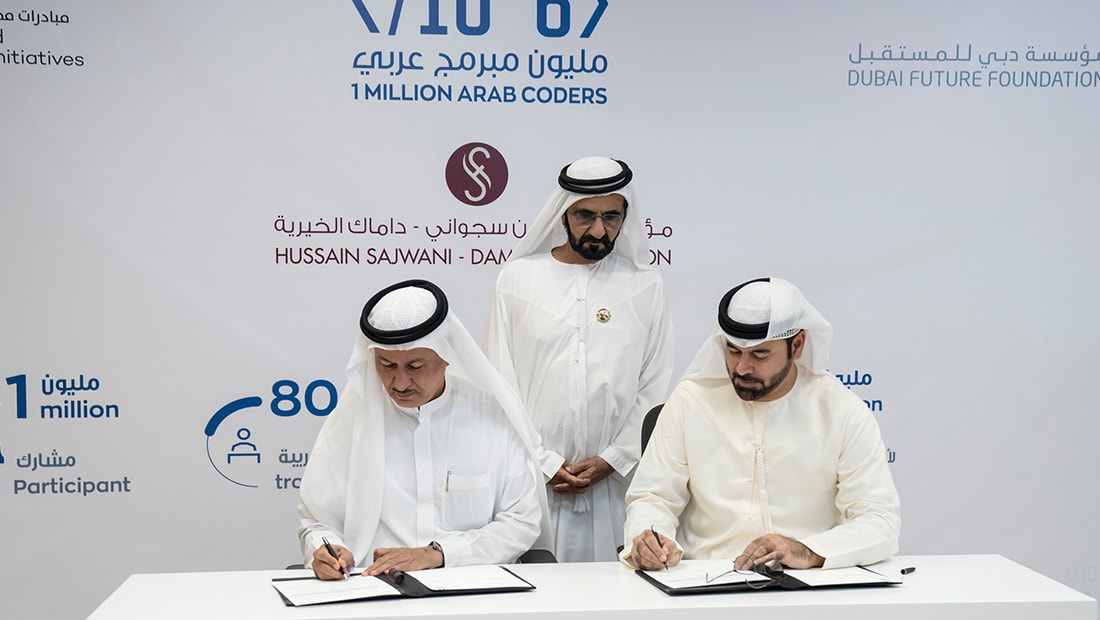
The Hussain Sajwani-DAMAC Founda tion was recently honoured to take a lead role in supporting a pan-Arab education initiative that aims to instill Information & Communications Technology (ICT) capability in the Arab World. The One Million Arab Coders Initiative, launched by His Highness Sheikh Mohammed bin Rashid Al Maktoum, will provide free software development training to one million Arabs.
The thought of training one million people to do anything, let alone to learn how to write software, is a profound indication of how our visionary leader wants to transform the ICT capability of the region. The Arab world is on the cusp of what was dubbed last year by World Economic Forum Founder and Chairman, Klaus Schwab, as the ‘Fourth Industrial Revolution’.
The rate of technological advancement in almost every sector is highly unsettling, not only to global business, but even to humanity’s outdated beliefs of its own limitations. The digital revolution is here, and the world must be prepared to embrace it or face certain economic annihilation, the type that has brought down entire civilisations in the past, whose governments at the time could not react quickly enough during periods of rapid change and progress.
In tandem with this development, the Arab world is at a crossroads of geopolitical uncertainty, disruptive economic transformation and an increasing population of educated youth reshaping the region’s priorities and its international roles, while redefining the image of Arab society as a whole.
Further, more than 50 per cent of the current 407 million inhabitants of the Arab world are under 25 years of age, which is anticipated to rise to 75 per cent by 2030. To move forward, the Middle East needs to address an alarming employment gap which, according to the Arab Thought Foundation and PricewaterhouseCoopers, requires the creation of an additional 80 million jobs by 2020. From this perspective, training a million Arabs to become software developers or coders, becomes an imperative to the region’s economic survival.
However, the GDP contribution of such a massive young work force that is gainfully employed, coupled with substantial inward flows of direct investment to a region that just added a million coders to its population, would have a positive economic effect worth billions of dollars.
The UAE government has been a champion in advancing human development skill sets in this region for some time, and this recent initiative launched by His Highness Sheikh Mohammed for the One Million Arab Coders project, reflects the government’s long-term approach to such a strategic imperative.
As part of its Vision 2021 agenda, the UAE government aims to make the UAE ‘Among the best countries in the World’ by 2021, the year this ambitious nation turns 50. The national agenda is divided into six pillars, which map six national priorities that the government will drive as it moves towards its strategic 2021 goals. Education and skills development are intertwined in most of the pillars, as these two factors impact many of the indicators that will measure the government’s progress.
As innovation, science and knowledge continue to drive the global competitiveness of the world’s nations and their economies, creating pools of highly–skilled workers becomes critical to the success and failure of any nation. As a father and as an Arab, I am pleased to be part of an initiative that leaves behind a legacy for our future generations and lays the foundations for their prosperity, economic security and happiness.
I encourage any Arab who is looking to advance their skills for their own personal growth, or wants a better chance to progress and enjoy a long and successful career, to visit www.arabcoders.ae and register for a free, online course on software development.